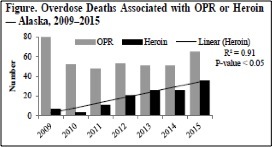The Senate Majority stands with Alaskans that have become increasingly frustrated with the increase in drug-related property crimes, which began trending upward in 2012. Daily, we hear of neighbors that have become first-time or repeat victims of crime. In 2015, long-prior to SB 91, I passed a bill focused on restitution for victims as a partial response to rising property crimes.
Eight months ago, the Legislature and Governor approved SB 91, reforming criminal justice practices. Our status-quo system wasn’t working. Incarceration was transforming petty thieves into hardened criminals. Two-thirds of those incarcerated would someday go back to jail.
The lion’s share of the problem is directly related to the dramatic increase of opioid pain reliever (OPR) and heroin abuse throughout Alaska. Although it is difficult to quantify actual usage increases, this graph from the March 24, 2016 State of Alaska Epidemiology Bulletin demonstrates the dramatic increase in OPR and Heroin related overdose deaths since 2009.
Although 2009 was an early outlier on OPR deaths, the trend illustrates that Alaska’s problem mirrors the overall US problem. The poor choices of drug abuse are presenting many good Alaskan families with the heartache of the unnecessary loss of people they love.
The goal of Senate Bill 91 was to reduce crime and increase the likelihood of reformation for offenders. The philosophy is specifically designed to separate those that can be successfully treated and once again become productive, from people that will likely remain in prison. The reinvestment philosophy has been successful in several staunchly conservative “tough on crime” states like Texas and Georgia. Our reforms brought evidence-based, best practices to Alaska that involved all stakeholders – victim rights advocates, police, corrections, the legal system and treatment providers.
The reforms hit the streets while law enforcement and the courts struggled to realign under much-reduced budgets. At the same time, independent of SB 91, the Judiciary branch revised its bail schedule to often release minor offenders shortly after their arrest. The combination of factors has frustrated all of us, especially victims of property crimes.
The rights and public safety of our law-abiding citizens must come first. To that end, we are committed to improvements that will support safe communities, demand accountability, and provide officers with revisions in statute they need to arrest and detain individuals that repeatedly break the law.
We are listening. Alaska’s law enforcement officers and prosecutors need certain tools to effectively do their jobs. We’ll ensure that the Departments of Public Safety and Law have the statutory support they need to take people unwilling to follow our laws off the streets, and to keep them off whenever public safety is at risk.
The recent release of new recommendations by the Alaska Criminal Justice Commission was the starting point for this adjustment campaign. This week, the Senate Judiciary Committee will begin hearing two bills. The first will be heard Wednesday and will correct over a dozen technical issues with SB 91. The second bill, which will be first heard in Judiciary on Friday, will increase sentencing for C felonies; escalate penalties for repeat misdemeanors; and add accountability for violating pre-trial release conditions.
SB 91 required extensive data collection and analysis. As these facts come in, we’ll have evidence to help guide future policy with a primary focus on public safety.
We’ll also evaluate issues affecting public safety not directly related to SB 91. Last year, Medicaid reform legislation strengthened the Prescription Drug Monitoring Program, an imperative step toward reducing opioid addiction. We will address changes in the bail schedule for stronger public safety. We understand law enforcement’s frustration when criminals quickly end up back on the street committing more crime.
SB 91 did not cause crime; our communities have been victimized with increases in drug use and theft for several years. In some cases, SB 91 increased penalties for the most heinous crimes, such as adding 10 years to the minimum sentence for murder.
However, we’ve heard the frustration and concern from our communities. We are committed to making necessary changes to support public safety and law enforcement using Article 1, Section 12 of the Alaska Constitution as our guide: “ …. Criminal administration shall be based upon the following: the need for protecting the public, community condemnation of the offender, the rights of victims of crimes, restitution from the offender, and the principle of reformation.”
We are calling on Alaskans to engage in productive dialogue that gets us all closer to our goal of safer communities. Thanks to the many Alaskans that have contacted us with constructive suggestions since we began this SB 91 improvement campaign. If you have not yet engaged, we welcome you to contact us by sending us a note to senatemajority@akleg.gov. We want to hear from you.
We have heard you and agree that SB 91 requires adjustment to deliver the best public safety product for Alaskans and our communities. The Senate Majority is committed to ongoing monitoring and a continuous improvement process to ensure that you are safe in your homes and that your property is protected from those that refuse to follow the law.
Senator Peter Micciche, Majority Leader of the Alaska Senate, represents District O (Kenai, Soldotna, Seward Nikiski, Funny River, Sterling Cooper Landing and Moose Pass).

